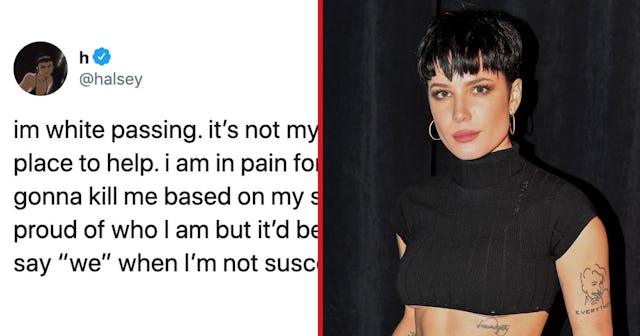Halsey Addressed Her Privilege As A 'White-Passing' Biracial Woman

Halsey explained why she cannot use the word “we” when discussing violence against the Black community
Singer Halsey has been vocal about the murders of George Floyd, Breonna Taylor, and Tony McDade, along with others whose lives have been cut short due to police brutality and systematic racism. Not only has she been posting her messages of solidarity and support to Twitter, but she’s joined the protests in the community of Los Angeles. On Tuesday, Halsey, who is biracial, took to Twitter to address her own privilege and what identifying as white-passing means for herself.
Halsey responded to a now deleted tweet that claimed the singer doesn’t claim her “Black side,” calling her out for saying “let black ppl speak,” instead of “let our ppl speak.”
Halsey replied to the tweet, explaining that because she is white-passing, she doesn’t feel like it’s her place to use the word “we” because she wouldn’t be targeted in the same violent lens due to her skin color. She wrote, “I’m white passing. It’s not my place to say ‘we.’ It’s my place to help. I am in pain for my family, but nobody is gonna kill me based on my skin color. I’ve always been proud of who I am, but it’d be an absolute disservice to say ‘we’ when I’m not susceptible to the same violence.”
This isn’t the first time Halsey has spoken up about her identity. Halsey, who is the daughter of a black father and white mother, told Playboy back in 2017 that she identifies as a black woman even if she “looks like a white girl.”
“I’m white-passing. I’ve accepted that about myself and have never tried to control anything about black culture that’s not mine.” She added, “I look like a white girl, but I don’t feel like one. I’m a black woman. So it’s been weird navigating that. When I was growing up, I didn’t know if I was supposed to love TLC or Britney.”
Halsey’s fans applauded her acknowledgment of the privilege she was born with, with one Twitter user writing, “THIS is how you use your privilege for good. TAKE NOTES, WHITE AND WHITE PASSING AND NBPOC TO ANYBODY [WHO] HASNT SPOKEN UP YET. YOUR PLATFORM MATTERS AND WE NEED YOU.”
Halsey has consistently been posting about her experience protesting the violence against the black community, including photos and videos from protests in Los Angeles, along with sharing studies and reports that are meant to help educate those that racism goes beyond physical violence and murder. It is, unfortunately, the very fabric our country is built upon.
“A 2016 survey of 222 white medical students reported that half of them believed the myth that black patients ‘feel less pain’ than white patients, and were less likely to recommend appropriate care. 2016!” Halsey recently tweeted along with a link to the study.
Above all, Halsey reminds us that it’s important we examine institutionalized racism from all angles — and also examine our own privilege and be open about it. The more educated and aware we are, the more progress we can make as a community.